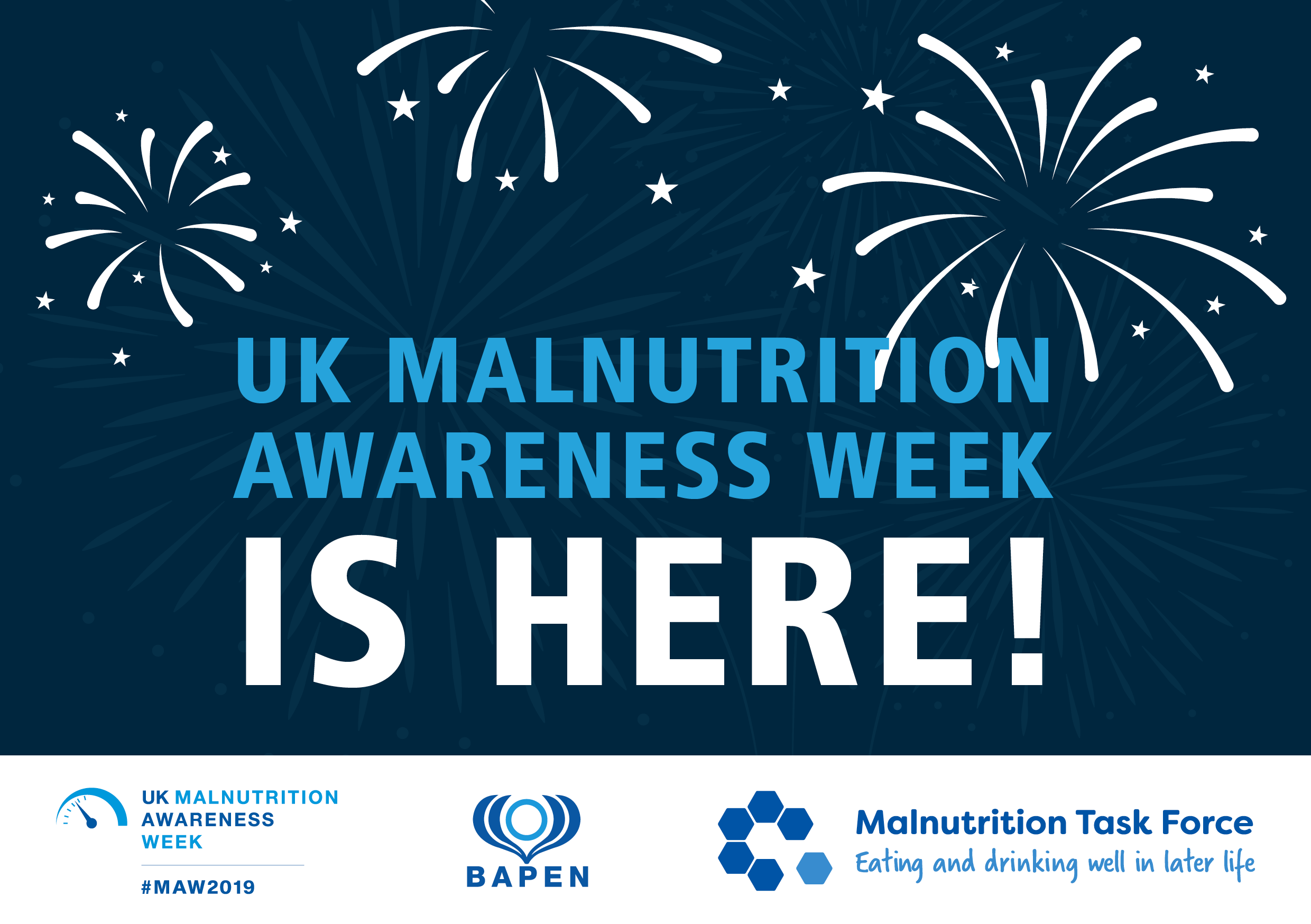Malnutrition Awareness Week 2019

Published on 13 October 2019 11:37 AM
Malnutrition Awareness Week is here!
UK Malnutrition Awareness Week (MAW) was founded by the Malnutrition Task Force (MTF) and BAPEN in 2018 to raise awareness of preventable undernutrition and dehydration in the UK.
Throughout MAW 2019, we are calling on everyone to screen themselves, their loved ones and those they look after to encourage people to recognise and understand the risks of undernutrition and dehydration in later life, and find out what they can do to prevent it.
Why malnutrition?
It is estimated that around one in ten people over the age of 65 are malnourished or at risk of malnutrition. Malnutrition is both a cause and consequence of ill health and is a silent and all too often hidden problem. It will affect health and wellbeing, increasing hospital admissions, and can lead to long-term health problems for otherwise healthy and independent older people.
Unfortunately awareness of undernutrition and its causes remains low, both among those working in health and care, and older people and their families. In most cases, malnutrition can be prevented with the right support in the community. Raising awareness of undernutrition, its causes and the simple steps we can all take to prevent it is key.
What's happening this week?
We'll be posting each day across our social media channels with more information on the following topics.
Monday 14th October - Self-Screening
Self-screening tools can identify if someone is at risk of undernutrition and can be used to start conversations about weight loss, eating and drinking, and provide basic advice to help the person improve their nutrition and wellbeing. A number of tools have been developed and can be used by community groups, volunteers, care workers, families and older people.
More Information and guidance can be found here
Tuesday 15th October - Education and Empowerment
Knowing the signs and symptoms of undernourishment is key for preventing malnutrition. We have produced a new resource Eating Well in Later Life which offers helpful tips for eating as life changes. The resource is useful for everyone - community groups, volunteers, care workers, families and older people!
Wednesday 16th October - Coughing and Spluttering
Some older people may find that they cough or splutter when they eat or drink. This can make eating and drinking enough difficult and uncomfortable and could increase risk of malnutrition and dehydration. However, there are things that we can do to help such as talking to a health care professional.
Thursday 17th October - Mouth Care
Maintaining oral health is an important part of keeping well; it’s key to preventing undernutrition. It’s important because it allows us to eat, speak and socialise without discomfort or embarrassment. Loose, broken and decayed teeth, poorly fitting dentures and pain makes eating hard. Reports show us that oral care is often lacking for older people who may be unable to carry out their own personal care and rely on others for help. This is particularly relevant in hospitals, community care settings and domiciliary care at home.
Friday 18th October - Dehydration
Dehydration occurs when your body loses more fluid than you take in. When the normal water content of your body is reduced, it upsets the balance of minerals (salts and sugar) in your body, which affects the way it functions. The body is affected even when you lose a small amount of fluid. Most of the time, we can prevent dehydration by drinking regularly throughout the day. Be guided by your thirst, but be aware that in hot weather, when exercising and during illness, you should drink more. As we age, we also start to naturally feel less thirsty so it’s important to keep an eye on how much you’re drinking throughout the day.
1 in 10 older people in the UK are at risk of malnutrition
Our aim is to:
- Raise awareness that preventing malnutrition is everybody's business
- Raise awareness of preventable malnutrition among those at risk, including older people
- Encourage people to screen themselves to indentify risk
- Mobilise the community to come together to prevent malnutrition
